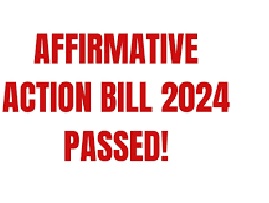
All must help to make Affirmative Action Bill work
On Tuesday, July 30, 2024, Parliament passed the historic Affirmative Action (Gender Equity) Bill. The passage of the bill represents a landmark legislative effort in Ghana’s ongoing journey towards achieving gender parity across all sectors of society.
The bill seeks to address the historical and systemic gender imbalances that have long permeated the nation’s political, social, economic and cultural landscapes.
The Affirmative Action Bill was first introduced in Parliament in 2016 to prioritise an increase in women’s participation in governance and decision-making at all levels.
It encourages diversity at all levels and lays out policies and procedures to guarantee that underrepresented groups, particularly women, minorities and people who are challenged, have equal opportunities and are actively involved in decision-making at all levels of leadership in the country.
Therefore, the Affirmative Action (Gender Equity) Bill 2024 represents a significant step forward in Ghana’s efforts to achieve gender equality. By addressing key areas such as education, health, employment, governance, and by aligning with international standards, the bill lays the groundwork for a more equitable and inclusive society.
The bill aligns with international conventions and regional agreements to which Ghana is a signatory, such as the Convention on the Elimination of All Forms of Discrimination Against Women (CEDAW) and the African Charter on Human and Peoples’ Rights.
By incorporating these international standards, the Bill ensures that Ghana’s gender equality efforts are consistent with global best practices and commitments. As a signatory to all these conventions and charters, the government is mandated to integrate these obligations into national policies and programmes to promote gender equality at all levels.
The bill sets specific targets for gender representation, aiming for 30 per cent by 2026, 35 per cent by 2028 and 50 per cent by 2030. These quotas apply to appointments in public offices, governance positions, decision-making roles and leadership positions across various sectors.
Consistently, in the country, women's representation in decision-making such as at the district assembly level, Parliament, boardrooms, the Cabinet among others has been low.
While women constitute more than half of the country's population, that is 51.2 per cent, they represent only 13.8 per cent of Members of Parliament and constitute less than 30 per cent of ministers, members of the Council of State, heads of public institutions and boards. At the just-ended 2023 local level elections, only 4.1 per cent of elected assembly members were women.
The bill, which is yet to be assented to by the President, when implemented, will ensure gender-responsive budgeting, where all government ministries, departments, agencies and district assemblies will have to include budget lines for addressing gender-specific issues in their plans.
Also, the bill will ensure that political parties achieve progressive gender equality targets in participation and representation. They must adopt measures to support gender equality in candidate nominations and party leadership appointments. Political parties are also required to provide information and financial resources to support gender equality initiatives.
The Electoral Commission monitors compliance, ensuring that political parties develop and adhere to gender equality policies and submit annual reports on their progress.
The bill cuts across several sectors, which include the Ministry of Education which is to ensure gender balance in access and opportunity to education at all levels.
It includes provisions for reviewing curricula to include courses on gender equality, establishing programmes to address barriers to education for girls and providing appropriate interventions in deprived districts. Particular emphasis is placed on promoting girls’ education through various incentives and support mechanisms, ensuring their retention and success in the education system.
The Daily Graphic commends the Affirmative Action Coalition, the Ministry of Gender, Children and Social Protection, Parliament, especially the Speaker, Algban S. K. Bagbin, and all who contributed in diverse ways to the passage of the bill.
We, however, call on state and non-state actors to look out for potential challenges such as resistance from sectors unaccustomed to gender quotas.
There is also the need for robust monitoring and evaluation mechanisms to ensure genuine compliance by addressing deeply ingrained cultural and societal norms that perpetuate gender inequality.
